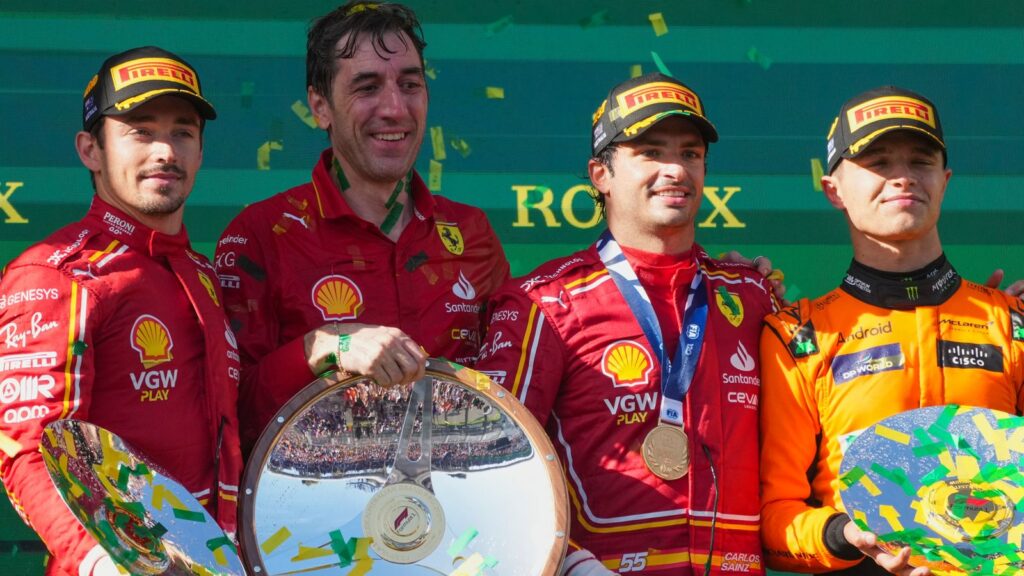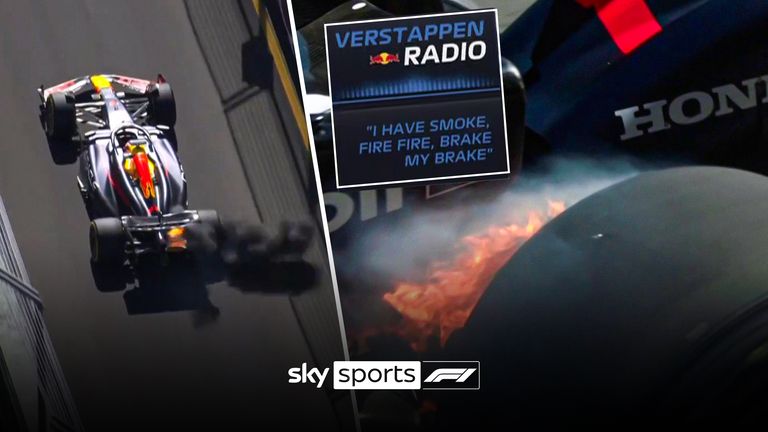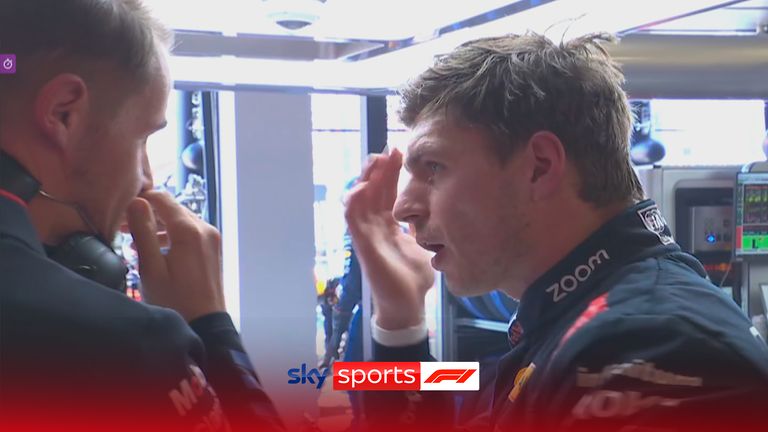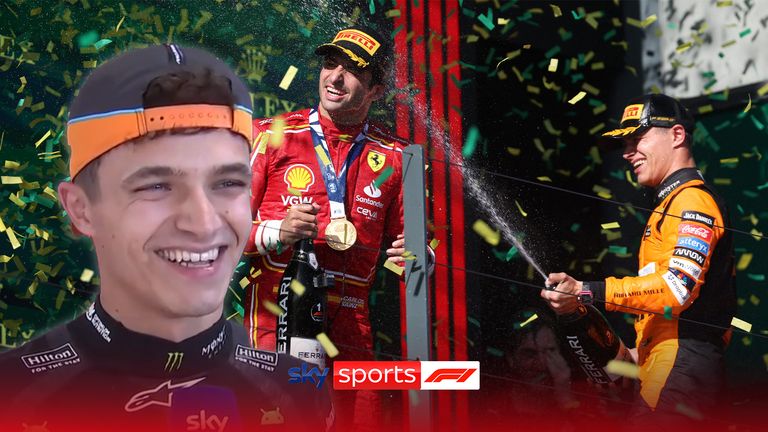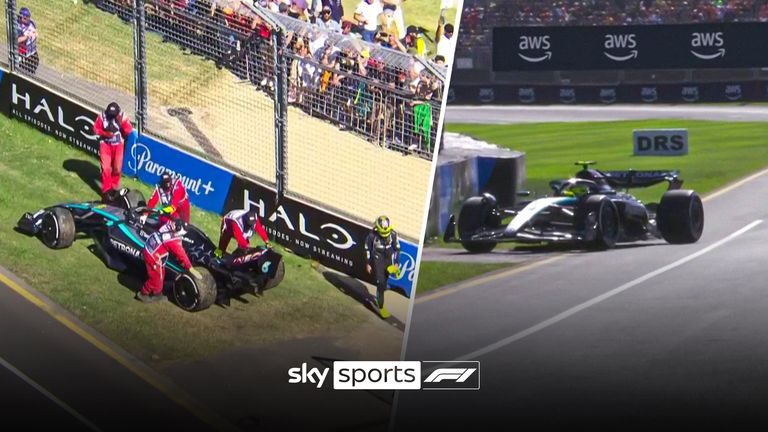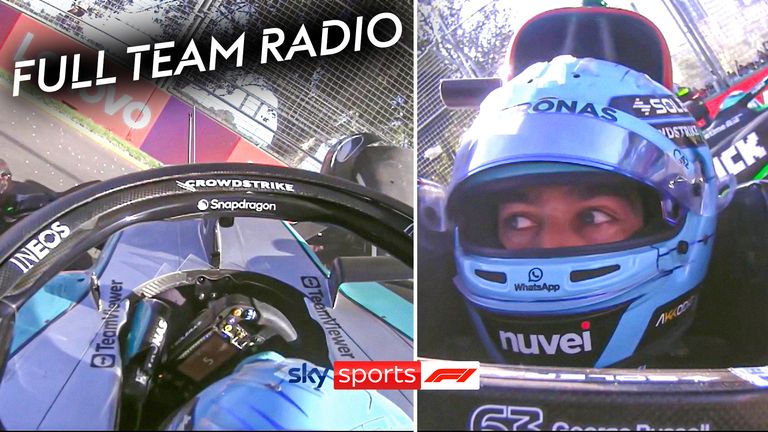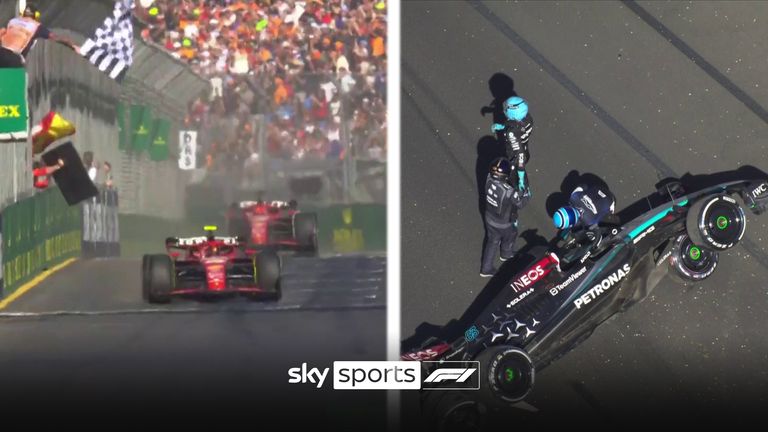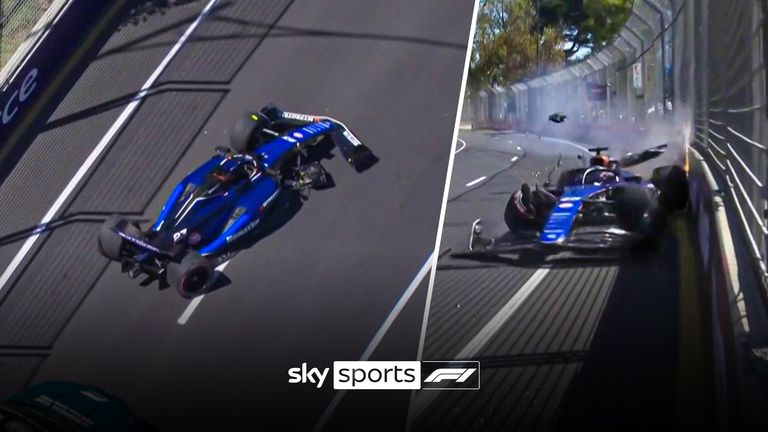I feel guilty for thinking it, but it was a relief to see a different winning team and driver in Melbourne. Nothing against Red Bull or its drivers, they’ve been immense, but the chorus of ‘F1 needed that’ echoed through the paddock post-race.
Carlos Sainz was the hero of the day, and fans’ driver of the day for the second time in his two races this season.
Even when I chatted to him on the grid just before the race, I was perturbed that he still looked fragile and moved more slowly than normal after his surgery for appendicitis. There was nothing slow-moving about his race pace though, he was sensational throughout.
In his words he is “jobless” for next year, and that was one hell of an advert for his talents yet again. If he’d driven in Jeddah, it’s highly likely he’d be leading the world championship now.
Would Ferrari have beaten Red Bull anyway?
Ferrari clearly had a good pace both on single lap and longer runs throughout the event and appeared to be able to manage the graining of the tyre surfaces better than Red Bull and others.
Max Verstappen delivered a ‘Max-like’ lap to secure pole position, but Red Bull had to add some front wing set-up for the race, one of the few permissible changes in parc fermé lock down, in order to protect the front tyres from sliding too much.
It was all inconsequential because his rear-brake caliper stuck on the grid, akin to leaving the handbrake on, and would quickly and spectacularly overheat that corner meaning he would experience his first non-finish for 43 races.
We often see the cars smoking away on the grid as the drivers have punished the brakes on the formation lap to help prepare them – and the wheel rim and tyre core temperatures – for the start and first few corners.
The big question is whether Ferrari would have beaten Red Bull anyway.
Sainz had already overtaken Verstappen but the RB20 was ailing. Sergio Perez in the second Red Bull would only finish fifth, some half-minute behind, before the virtual safety car intervened on the last lap, but he apparently had some aerodynamic damage having earlier shown very good pace.
McLaren kept Ferrari remarkably honest with their race pace suggesting Verstappen would have been right in there. We’ll never know the answer to the question of course, but my gut feeling all the way through was that it was Ferrari’s day.
Despite his incredible run of successes Verstappen was initially very angry that his car had failed. When the adrenaline washes away he has become good at a managing these moods now, but if he ever loses that fiery passion in the heat of the moment you’ll know he is getting ready to retire.
Charles Leclerc, second in the sister Ferrari, had the good grace to say that Sainz had been the faster driver in qualifying and the race. It must have hurt him that his walking-wounded team-mate, minus his appendix but carrying some scars, had outperformed him.
And a new-found calm in the Ferrari team meant that the race strategies were efficiently delivered, particularly to keep Lando Norris at bay in the McLaren.
Contrasting fortunes at McLaren and Mercedes
Norris told me after the race he should have been second, such was his confidence in his race car and pace. But Ferrari had pitted Leclerc on lap nine onto hard tyres, and his early pace on fresh rubber meant that he undercut and got ahead of Norris when he pitted on lap 14. It generated critical track position which would secure the one-two for Ferrari.
It’s telling that Norris was disappointed with only the final step on the podium – McLaren have had a very solid start to the season. Hopefully they can finesse the cars into Ferrari and Red Bull territory, because both drivers and the team seem perfectly ready for the next step.
Unlike Mercedes-Benz. When I was out on track on Friday it appeared to me that Lewis Hamilton’s Merc was perhaps the most difficult to drive.
Through the high-speed chicane which makes up turns one and two, the car was all over the place. For the third consecutive season they haven’t hit the sweet spot with this era of ground effect cars, and then can’t seem to contain the unpredictability of performance thereafter.
Team boss Toto Wolff always has elegant words and phrases to move the story on and refocus for the next race or season, but it must be wearing very thin for him to see the lack of progress. And as often happens in such circumstances, reliability also went out of the window with a bang for Hamilton’s power unit.
How Alonso tried to ‘wrong-foot’ Russell
But for his seat belts, George Russell would have fallen out of the side window of his Mercedes with a bizarre incident behind Fernando Alonso on the penultimate lap.
What started as a fast-closing slide in turbulent air to avoid the unusually-slow Aston Martin of Alonso at the turn six apex developed into a run through the gravel trap, clout of the wall, and then the car tripping over its own discarded wheels kept attached to the chassis with the very effective tethers.
The end result looked a bigger accident than it was in some respects, as the car resting on its side now blocked the gravel-strewn track. The leaders were on the last lap and race control covered the incident with a ‘virtual safety car’ meaning all drivers had to slow down to a target time on their dashboard.
Furthermore, the zone was covered by double-waved yellow flags which means slow down and be prepared to stop. But being just around a blind corner and now with personnel and the Medical Car on site, that situation had ‘red flag’ written all over it. Thankfully cars bumped alongside and past, and the chequered flag was shown at the end of the lap.
Alonso had gotten ahead of Russell due to a fast pit stop under the virtual safety car deployed when Hamilton’s Merc ground to a halt. Russell had caught back up and was shaping up for an overtake for several laps.
Alonso claimed on the radio that he’d a throttle issue of some kind which is why he was slower than normal on the T6 corner. Russell was obviously pushing hard to be in range for a double dose of DRS assistance down the next two straights, and you never head into a corner making a speed reduction just in case the driver ahead has, or creates, an unexpected deceleration. You’re not a racing driver if you do.
Alonso popped his saintly halo on and went to see the Race Stewards, explaining how he intended to approach turn six differently for a better exit speed which included decelerating 100 metres earlier, brushing the brake, and even a downshift.
This is what caught Russell out. We’ve seen Alonso do that before in Nurburgring in 2003 against David Coulthard, and he had exactly the same playbook. Except this time, it caused a huge amount of costly damage for a team who could well be on his wish list.
Fernando’s defensive position is, while quoting other epic and clean battles he’s had over the decades, that changing racing line or sacrificing entry speed for a better exit is part of the art of motorsport, and that in fact it was the nature of the gravel trap run-off area which caused Russell’s crash. Furthermore, that a driver cannot be responsible for making every lap identical while managing many other variables.
I personally have no doubt that Alonso intended to wrong-foot an eager Russell heading into a clear overtaking zone, but I doubt he intended such a violent outcome for the Mercedes driver. He was penalised by 20 seconds on his elapsed race time, dropping him to eighth.
‘Difficult’ times for Ricciardo and what happens next in F1 at Suzuka?
Yuki Tsunoda inherited seventh after Alonso’s penalty following a fine drive again for Team RB. His team-mate Daniel Ricciardo had a time deleted for track limits in qualifying and could never really recover into the head of the midfield. Difficult times there, and paddock rumours are swirling.
The Haas team played a lot of smart hands to maximise their potential with both cars in the points in ninth and 10th. Nice job.
Williams had a weekend to forget while losing Alex Albon’s chassis in a practice crash and alarmingly not having a spare. The one remaining was taken from Logan Sargeant and turned into an Albon car, which then finished tantalisingly 11th and out of the points. Williams still won’t have a spare chassis in the next round in Japan.
The Alpine team had another dismal weekend, they really are struggling for any kind of pace or direction, and having lost so many experienced people you can’t help but wonder how long it will take to turn around.
At least Pierre Gasly in his Alpine was able to beat the two Saubers, who risk getting a parking ticket at a pit stop because it takes so long, while they address a design issue on their wheel nut and axle.
Onto Japan, a track which should suit Red Bull well, and it will be telling how close Ferrari and others can get. Or even ahead.
Red Bull’s recent apparent civil war amongst key players must have destabilised the team, will that take time to filter through, or did we already see some effects of that in Australia? Or has peace broken out quickly enough for them to keep the flywheel turning and the dominant and winning momentum intact?
Formula 1’s biggest ever season continues with the Japanese Grand Prix, live on Sky Sports F1 from April 5-7. Stream every F1 race and more with a NOW Sports Month Membership – No contract, cancel anytime




